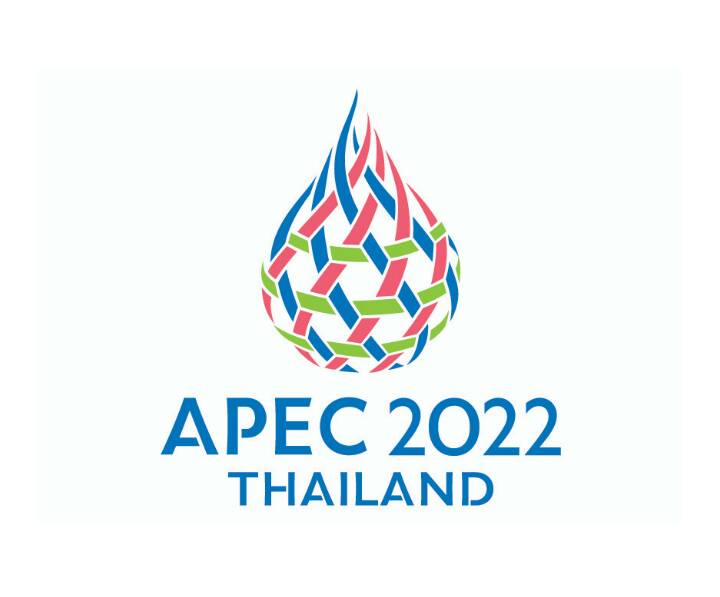Thailand Unveils Logo for APEC 2022 Chairmanship
Thailand Unveils Logo for APEC 2022 Chairmanship
วันที่นำเข้าข้อมูล 6 Dec 2021
วันที่ปรับปรุงข้อมูล 30 Nov 2022
Thailand Unveils Logo for APEC 2022 Chairmanship
Thailand has unveiled a new logo for its chairmanship of the Asia-Pacific Economic Cooperation (APEC) Summit 2022, weaving its cultural identity with its 2022 ambitions for sustainable and inclusive post-COVID-19 recovery.
Chalom as a symbol

A chalom is a kind of Thai bamboo basket used to carry travel items and goods as it has become a symbol of trade in Thailand since ancient times.
The interlaced bamboo strips are strong, resilient, and durable—all qualities that are necessary to bolster the regional economy and help it grow with “stability, prosperity, and sustainability,” the watchwords of the Thai administration. The 21 openings in between the interwoven bamboo strips signify all 21 member economies in APEC.
The characteristics of chalom also reflect the theme of Thailand’s host year, “Open, Connect, Balance,” as in open trade (signified in blue), connectivity (pink), and balance (green) under the Bio-Circular-Green (BCG) Economic Model.
Meet the designer
Chawanon Wongtrakuljong from the Faculty of Architecture, Chulalongkorn University, who submitted the winning design, explained his rationale.
“If you talk about Thai travel, most people would probably think of the tuk-tuk, and if you talk about Thai food, most people would think of tom yum goong… the key factor these two things had in common was ‘time.’ If time is the common denominator, then what has been with the Thai people for a long time in terms of trade and economy?”
Chawanon added that the chalom’s woven bamboo material represents environmental friendliness and its durability represents sustainable cooperation.
The Ministry of Foreign Affairs had collaborated with Silpakorn University to hold a logo contest, inviting professional and aspiring Thais under 25 to submit designs. The criteria was to evoke Thailand’s identity and reflect the themes of cooperation during the upcoming APEC chairmanship. The competition saw a total of 598 entries.
Speaking of the competition itself, Chawanon called it “a rare opportunity” that a Thai youth like himself could design a logo that would become the symbol of a global-level conference.

The opportunity is especially rare, given that the last time Thailand served as the host economy for APEC was in 2003. Each year, APEC rotates hosting duties among its 21 member economies.
Thailand as the APEC 2022 Chair
Taking over hosting responsibilities in 2022 will allow Thailand to play a role in policymaking for regional economic cooperation and access resources for analyzing global and geoeconomic trends.
In turn, Thailand will address inequalities and unsustainable imbalances exposed by the COVID-19 pandemic by driving a paradigm shift in the Asia-Pacific region via the BCG Economic Model for lasting recovery in a post-COVID-19 world.
The Kingdom will also seek to accelerate a revival in the travel and tourism sectors by expanding the APEC Business Travel Card (ABTC) to more professions, as well as promote long-term sustainable wealth by advancing the realization of the Free Trade Area of the Asia-Pacific (FTAAP).
APEC at a glance
The APEC framework was established in 1989 with the goal of promoting trade and investment, economic integration, academic cooperation, and knowledge exchange between its members.
Originally, its founding members comprised the United States, Canada, Australia, New Zealand, Japan, South Korea, Singapore, Indonesia, Malaysia, Brunei Darussalam, the Philippines, and Thailand. Currently, APEC has 21 member economies.
Since 1994, APEC has been committed to the Bogor Goals of liberalizing trade and investment. In 2020, APEC adopted the APEC Putrajaya Vision 2040, defining its direction for the next 20 years. The document adds to its goals of promoting technology and innovation, as well as sustainable and balanced growth.
APEC has three official observers, namely the ASEAN Secretariat, the Pacific Economic Cooperation Council (PECC), and the Pacific Islands Forum Secretariat. Representatives from these groups participate in APEC meetings and have full access to documents and information related to the work of member economies, helping to track progress and provide guidance in support of APEC objectives.
สถานเอกอัครราชทูต ณ กรุงเตหะราน
Office Hours: Sunday to Thursday, 08:30-12:00 and 13:00-16:30 (Except public holidays)